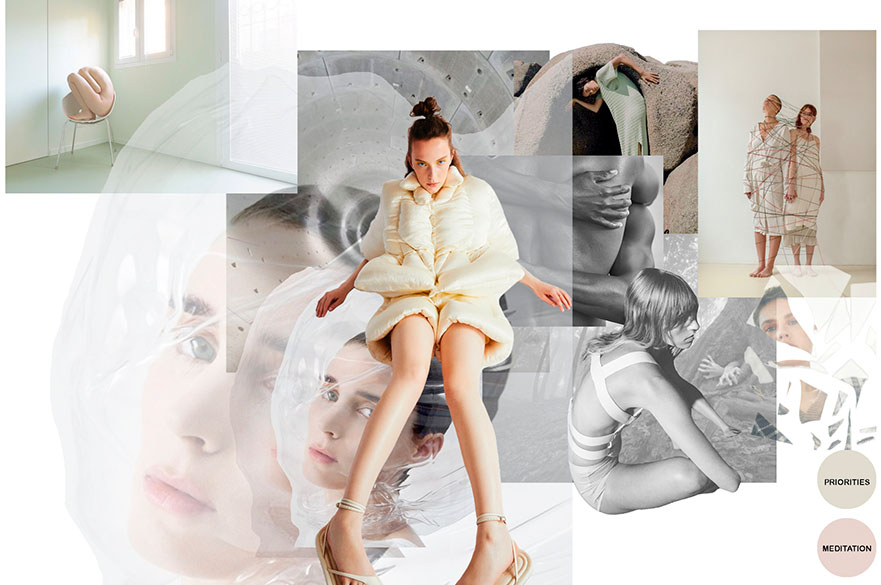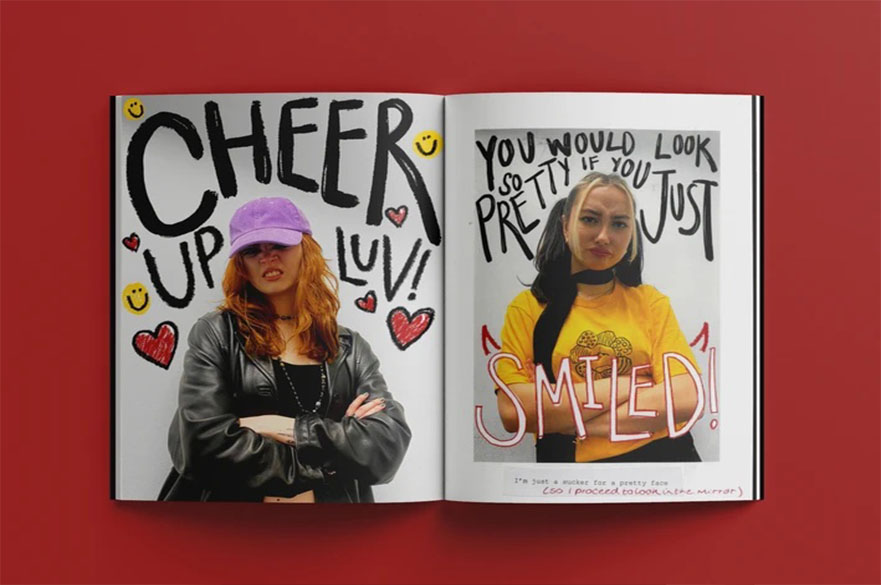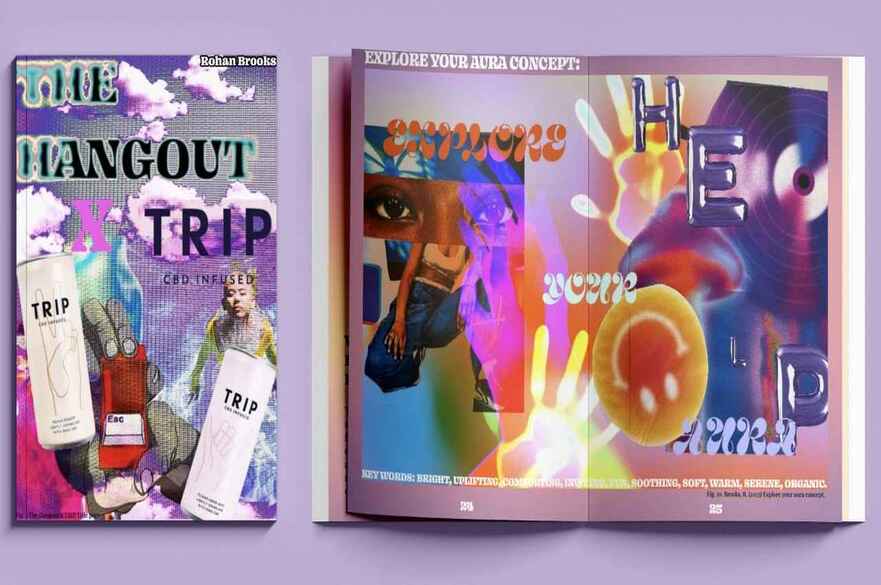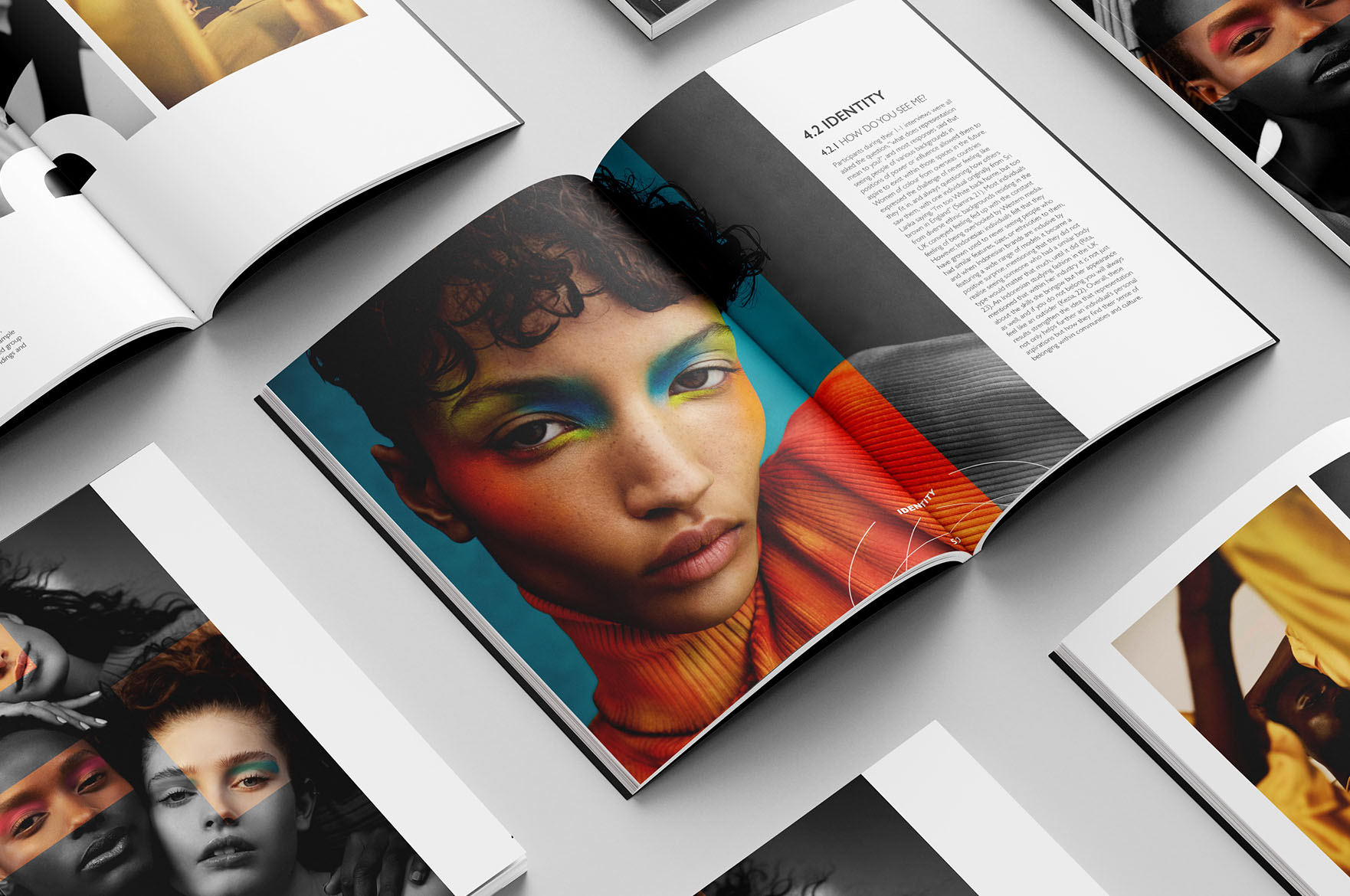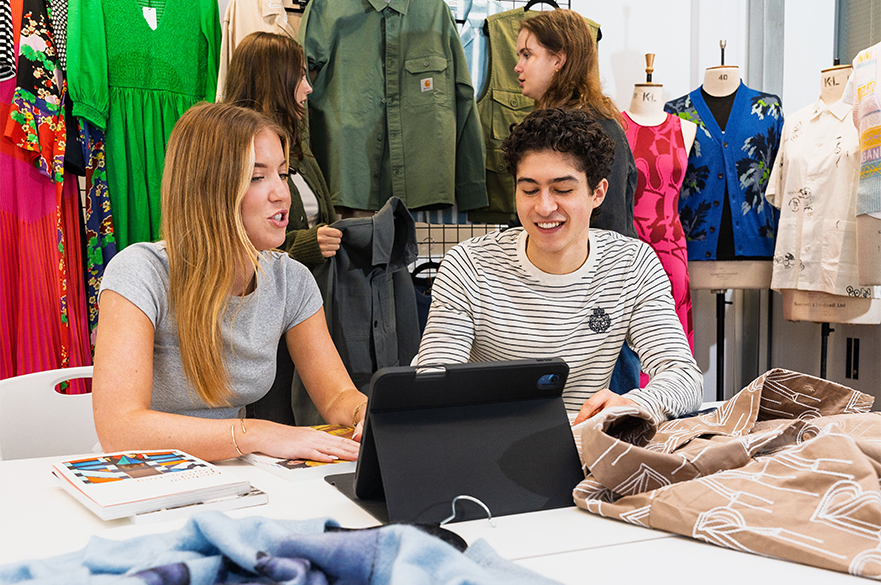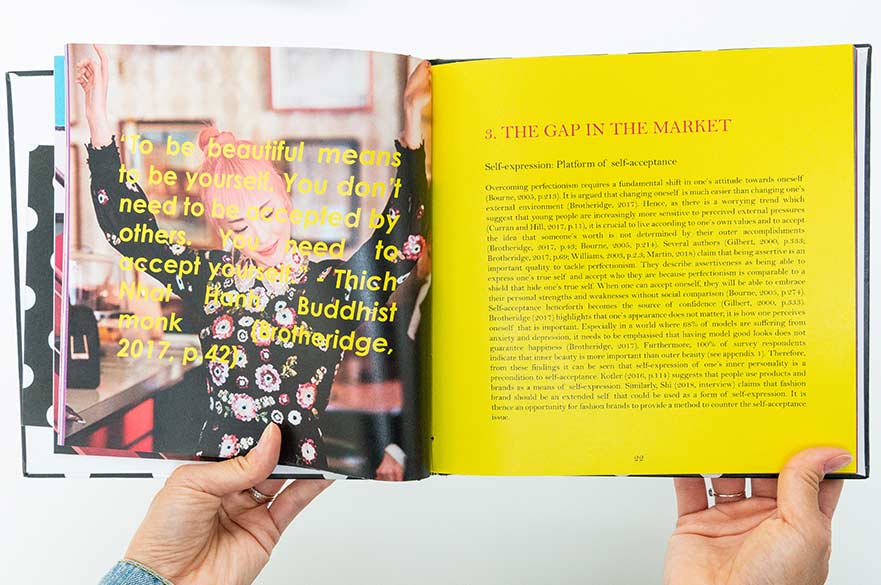This course is in Clearing
Offers from 80 tariff points
About this course
What is fashion communication and promotion? Simply, it’s the science of understanding people, the art of reaching them, and the magic of persuasion. We’re the ones who inspire desire — the people behind every purchase.
We tell creative, persuasive, sometimes disruptive stories about brands. We strike chords, we stir emotions, and we strive to do it in an honest, ethically responsible way. We’re free-thinking, hands-on, sleeves-up creatives, working at the point where fashion and culture collide — developing the world’s most memorable advertising campaigns, and bringing companies to life through screens, magazines, and retail environments.
Learn how the iconic names in fashion and beauty have been built from words and pictures. See what AI and immersive tech mean for the future of advertising campaigns, and how they’ll enrich your own creative vision. Develop your own visual identity, finding inspiration in music, film, art, and human experience. Work with real brands on real briefs, and learn to predict trends — not just react to them.
It’s time to start telling your own story. Let’s create.
-
Work on live creative projects with the hottest new names in fashion, beauty, music and event promotion, and more!
-
Tour the UK’s fashion hubs, and enjoy an optional second-year trip to one of Europe’s major style capitals.
-
Study abroad with one of our famous international partners, like the Fashion Institute of Technology in New York City.
-
Build those priceless professional connections with an optional placement — lasting from either six weeks to one year.
15
What you’ll study
NTU was rated ‘Gold’ in the 2023 Teaching Excellence Framework, meaning you’re in good, knowledgeable hands — from the support you receive in and outside the classroom, to the quality and relevance of what you’re being taught. Fashion communication and promotion is continually evolving, and it’s our job to make sure your career’s future-proofed for years to come.
Together, we’ll explore the past, present and future of the craft, growing your core creative skills and asking some big, human questions. What works, in terms of great visual storytelling? How can your imagination work in harmony with AI, the emerging force in campaign production? How do we ensure that we’re building desire in an ethically sound way — not just encouraging consumers to “spend money they’ve not got on things they don’t need, to impress people they’ve never met”? Together, we’ll be answering questions like these — and many, many more.
Throughout the course, you’ll:
- look at the behaviours and needs of customers, explore their connections to different subcultures and identities, and learn how to build meaningful, memorable relationships
- explore the psychology and creative methods for establishing desire, and learn how to do it in a responsible, sustainable, and authentic way
- grow as a creative and a risk-taker, taking inspiration from diverse corners of popular culture to challenge stereotypes and find new ways of thinking, talking, and making
- develop CV-boosting multimedia production skills in areas like photography, film, graphics, print, and digital and retail design
- take a deep dive into trend prediction — NTU has more graduates involved with The Future Laboratory trend forecasting agency than any other UK university or fashion course
- apply the same design processes as the pros, working collaboratively to understand the bigger picture of roles, responsibilities, and workflow processes throughout the industry
- have the opportunity to complete a certificated professional placement — either for six weeks, or up to a whole year
- stay focused on your employability — we’re big on making sure you’re ready for industry life, from the quality of your online portfolio, to the voice of your comms, to the day-to-day practical skills you’ll need to shine.
There is an opportunity for students to undertake a placement year, and transfer to the Sandwich route, please see further details in the ‘Year Three’ section below.
Here’s a full breakdown of the modules you’ll be studying.
Perspectives in Fashion Communication and Promotion
(40 credit points)
In this module you will style, cast and produce fashion photoshoots on both sides of the camera, edit and sequence images into a fashion editorial and publish your ideas in zines and printed publications. You’ll create content for social media, practising your creative copywriting and fashion journalism skills, enhanced with moving image and film making. And you’ll explore the worlds of fashion advertising and PR, producing an industry-ready pitch-deck.
Passport to Creative Process and Technology
(20 credit points)
Develop your fundamental graphic design skills including layout, typography, image creation and photo editing. You’ll move into the world of moving image and film making and become confident in the use of industry standard software including Adobe Creative Suite. If you’re new to creative work, this module is a rapid and effective bootcamp; for those with a creative background it's an opportunity to cultivate higher skills through experimentation and refinement.
Fashion Anthropology
(20 credit points)
Unpack the meaning behind fashion, investigating how individual style and personal identity are deeply connected. You’ll speak to people about how their personal fashion and style choices reflect who they are and who they aspire to be, and you’ll explore the connections between fashion and sub-cultures.
The Fashion Industry and You
(20 credit points)
Discover the broad range of job roles open to course graduates, and prepare for internships, placements and the first stages of employment within the fashion industry career. This module introduces areas of practice, and explores opportunities for working within brands, within creative agencies and as a freelance creative practitioner. It provides a place to review and refine your interests and skills, and an opportunity to develop a plan to support your career aspirations, ambitions and overall employability.
Advanced Creative Process and Emerging Technology
(20 credit points)
Explore both the advancements in technology that will support communication and promotion in the future and expand the digital and analogue craft skills required to support your work. Working with artificial intelligence (AI), virtual and augmented reality (AR / VR), and cutting-edge 3D technology, you’ll be part of the experiments driving the future of the fashion industry, supported by the expertise and resources available across Nottingham School of Art and Design.
Agency of the Future
(40 credit points)
Experience the excitement, creativity and fast pace that comes from working in a forward-thinking creative agency, responding to briefs from fashion industry clients. You’ll develop advanced team-working and team-management skills and strategies and increase your confidence in pitching your ideas and responding to real industry feedback.
Fashion Futures
(20 credit points)
Build your skillset as a trend researcher, forecaster and consultant. You’ll be introduced to the technical practice of trend forecasting to explore the relationship between societal changes and shifting movements, styles and tastes. You’ll also gain industry insight across a variety of sectors – including clothing, retail, beauty, health and wellness, food and drink, travel and hospitality – with a focus on future thinking and areas of innovation.
Critical Fashion Journalism
(20 credit points)
Begin developing your opinion and critical voice within the fashion industry in order to influence, persuade and inspire. You’ll discover strategies for keeping up-to-date and start the journey towards expertise and authority in your chosen field. You’ll also learn new writing techniques and cultivate your own tone-of-voice and personal communication style. And you’ll explore how fashion journalism uses print, digital, audio and video for seamless communication.
Co Lab: Research, Exploration and Risk-taking
(20 credit points, second half of the year)
Through active participation with team-based problem solving, you will work together in mixed teams on a project where you will use your creative ideas to generate solutions to the challenge or brief. Your project will allow you to explore how creativity can make an impact in society, as you choose a theme of sustainability, social justice, enterprise and innovation or community. This collaborative learning experience will expose you to a range of new processes and approaches that will develop your creative thinking.
You will also choose one 20-credit Optional module from:
- Trend Forecasting
- Buying, Merchandising and Product Fundamentals
- Digital Marketing and Communication
- Creative Live Event Production
- Web3 & Creative Autonomy
- Beauty Industry: Innovation to Impact
- Fashion Photography: Cover Shoot
- Fashion Styling
Optional Placement Year (Sandwich)*
We have an option for all of our students to undertake a placement year (Sandwich) and allow you to decide whether this is right for you once you have completed years 1 and 2 of your course. This time spent working in industry provides our students with crucial work experience, which is highly prized and much sought after by employers upon graduation. If you are successful in securing a placement you will have the chance to gain an additional Certificate or Diploma in Professional Practice, dependent on duration.
The additional placement year incurs a fee. For international students considering the transfer to the 4-yr SW route it’s important to seek advice from the International Student Support team and the Home Office regarding any potential visa implications and costs. For UK students, advice should also be sought regarding SLC eligibility, if applicable.
* If you choose to take the sandwich route option, you will still need to apply for this course with the full-time UCAS code: WN2M
Personal Project
(60 credit points)
Explore, research and creatively respond to a topic of your own choice within the wide landscape of fashion communication and promotion. You’ll apply the specialist skills you’ve learned during the course to your own interests, passions and career aspirations, demonstrating your intellectual depth, creative abilities and understanding of fashion culture.
This personal project is an opportunity to work in-depth and in detail, applying your developing practice as you research, evaluate and propose an industry problem and associated creative campaign solution.
Personal Project
(40 credit points)
Bring together your three years of personal development, supported by goal setting, reflection and tutor feedback. You’ll advance your skills in confidently communicating who you are to industry, using relevant digital self-promotion. This module prepares you for entry into your chosen industry sector by further developing, connecting and showcasing the range of competencies developed across the course journey.
Live Project Project
(20 credit points)
Working in a fully professional approach, you will respond to a real fashion industry problem from a real industry client, a powerful springboard into your career. This module challenges you to create an innovative and commercial response to a real industry brief of your choice. You will propose, pitch and evaluate a dynamic creative campaign, along with supporting process and workflow undertaken as part of a team.
This provides you with an opportunity to develop and test industry readiness with support and feedback from creative professionals.
We regularly review and update our course content based on student and employer feedback, ensuring that all of our courses remain current and relevant. This may result in changes to module content or module availability in future years.
Don’t just take our word for it, hear from our students themselves
Student Work
Video Gallery
How you're taught
Who better to tell you about communication and promotion than the people who’ve worked in it for years? Your lecturers made their professional names as graphic designers, illustrators, art directors, filmmakers, copywriters, creative strategists, consultants, event managers, and more; alongside our high-profile guest speakers, they’ll introduce you to industry contacts, keep you up to date on the newest trends, and guarantee that your own creative voice stays loud, proud, and fresh.
We’re a family, welcoming people from a huge range of backgrounds. We’re here to help nurture your creative bravery, and that’s why our course is as much about attitude and lifestyle as it is learning. To find and shape that bravery, you’ll learn through:
- lectures, where you’ll explore the key creative methods in visual storytelling, and answer that all-important question: what is fashion communication and promotion?
- workshops, where you’ll learn and apply new technical skills; supportive studio sessions, for a more community-focused approach to creating; friendly small-group tutorials; and regular one-to-ones, to make sure you’re happy, inspired, and energised throughout the course
- Co Lab, where you’ll learn about the industry’s different roles and responsibilities by partnering with students from other fields to meet a real-world industry brief
- exciting live projects, working with big names like Levi’s, Paul Smith and Revolution Beauty; up-and-coming independents such as TSPTR, Dawson Denim and All We Are; and creative agencies like McCann, helping clients like Chanel and Adidas find creative answers to business challenges.
- regular field trips, and the chance in Year Two to study abroad with one of our international exchange partners
- industry competitions — get your name known nationally at the Drum Awards, D&AD, Creative Conscious, the Adobe Design Awards, Blue Print for All, Future Lions, Young Creatives Nottingham, the One Club, and Graduate Fashion Week
- an optional placement, to build up your own professional reputation — recent destinations have included ASOS, Calvin Klein, Rimmel, Coty, Stella McCartney, and Tommy Hilfiger. Choose from our six-week Professional Practice Certificate, or a longer Professional Practice Diploma in Year Three.
How you're assessed
People shine in different ways, and we want everybody to have the best possible chance of success.
We believe in ‘authentic assessment’, which means measuring your progress based on the everyday things you’ll actually be doing in the industry — not essays and dissertations. This is an active ‘doing’ degree, not a passive writing one, and that ‘doing’ covers everything from perfecting your presentation and pitching skills, to the creative evolution of your online portfolio, to mastering new technical skills in the art of visual storytelling. These are the kinds of things you’ll be assessed on, all through the course.
Visit our ‘We Are Creatives’ showcase to explore this year's graduating students’ work — and get a taste of the work you could be producing yourself.
Careers and employability
We’re constantly delivering new talent to the wide and wild world of fashion promotion. Confident, connected, and industry-ready, our students have found homes in fashion advertising, PR, content creation and publishing, trend forecasting, graphic design, copywriting, account and campaign management, social and entertainment media, and visual merchandising — to name just a few.
You’ll graduate with the skill, vision and commercial savvy to stand out in a competitive field. If you want to find a future in this global industry, a ‘passion for fashion’ alone won’t cut it — you’ll need connections, a keen cultural eye, plenty of hands-on experience, and a great portfolio. That’s exactly what we’ll provide you with. With theoretical knowledge, practical talent, and the support of our award-winning Employability team, you’ll graduate knowing who you are, how you work, and where you want to go.
We’ve got people in every corner of the industry. Today, our former students are working as / at:
- Brand Creative, Uskees
- Account Executive, Here Be Dragons
- Partnership Executive, Lounge Underwear
- Account Manager, Nzime
- Creative Coordinator, TikTok
- Global Product Manager, Boots No. 7
- Marketing and Culture Manager, The Standard
- Paid Social Media Executive, Charlotte Tilbury
- Foresight Analyst, Future Laboratory
- Senior Account Director, W-Communications
What our students are doing now
The NTU alum with an inspiring remedy for loneliness
Holly Cooke explains how she set up The Lonely Girls Club, and how it now has over 70,000 members across the UK.
Arooj Aftab
Fashion students attend design brief workshop with iconic Nottingham designer
Campus and facilities
You’ll be based in the City Campus’ Barnes Wallis building, with everyday access to purpose-built editing suites, workshops, and all the professional tools of the trade. For a full breakdown of our brilliant facilities, just take the virtual tour.
Our City Campus has everything you’ll need to stay happy between lectures. As well as the Boots Library and its beautiful roof garden, there’s our superb Students’ Union building and two-storey, 100-station gym; a whole host of cafés, bars, restaurants and food outlets; performance and rehearsal spaces for musicians; and much, much more!
If that’s not enough, take just a few steps off campus and you’ll find yourself in the heart of Nottingham, one of Britain’s top 10 student cities. It’s big, small, old, and new — not just a place to study, but somewhere to properly call home. Tour the revolving run of street-food and fashion pop-ups in Sneinton Market; immerse yourself in the too-cool, late-night vibes of the Creative Quarter; get comfy in galleries, hidden cinemas and speakeasys; uncover a city that’s stuffed with secrets and independent enterprise. As an inspiration-hungry creative, there’s no better place to understand the heritage of the past, the possibilities of the present, and the promise of the future — all through the social, cultural and artistic lens of Britain’s original ‘rebel city’.
Entry requirements
This course is in Clearing
Looking for a place in Clearing? We are accepting application and would love to hear from you!
UK students
This course is in Clearing
Looking for a place in Clearing? We are accepting applications and would love to hear from you!
Clearing requirements
From 80 UCAS tariff points from up to 4 qualifications.
To discuss our entry requirements and see what we can offer you, call us now on +44 (0)115 848 6000. Alternatively, if you already have your qualifications, apply online via our Clearing Application form.
Preparing for results day? Beat the queue and sign up for NTU Priority for up-to-date information about all things Clearing. You’ll get an offer ahead of Clearing, subject to you achieving the required grades on results day.
To find out what qualifications have tariff points, please use our tariff calculator.
Additional requirements for UK students
There are no additional requirements for this course.
Contextual offers
If you don’t quite meet our entry requirements, we might be able to make you a lower offer based on a range of factors, including your background (such as where you live and the school or college you attended), your experiences and your individual circumstances (you may have been in care, for example). This is called a contextual offer, and we get data from UCAS to help make these decisions. We do this because we believe everyone with the potential to succeed at NTU should have the opportunity to do so, no matter what barriers you may face.
Meeting our entry requirements
Hundreds of qualifications in the UK have UCAS Tariff points attached to specific grades, including A-levels, BTECs, T Levels and many more. You can use your grades and points from up to four different qualifications to meet our criteria. Enter your predicted or achieved grades into our Tariff calculator to find out how many points your qualifications are worth.
Other qualifications and experience
NTU welcomes applications from students with non-standard qualifications and learning backgrounds, either for year one entry or for advanced standing beyond the start of a course into year 2 or beyond.
We consider study and/or credit achieved from a similar course at another institution (otherwise known as credit transfer), vocational and professional qualifications, and broader work or life experience.
Our Recognition of Prior Learning and Credit Transfer Policy outlines the process and options available for this route. If you wish to apply via Recognition of Prior Learning, please contact the central Admissions and Enquiries Team who will be able to support you through the process.
Getting in touch
If you need more help or information, get in touch through our enquiry form.
International students
This course is in Clearing
Looking for a place in Clearing? We are accepting applications and would love to hear from you!
Clearing requirements
From 80 UCAS tariff points from up to 4 qualifications.
To discuss our entry requirements and see what we can offer you, call us now on +44 (0)115 848 6000. Alternatively, if you already have your qualifications, apply online via our Clearing Application form.
Preparing for results day? Beat the queue and sign up for NTU Priority for up-to-date information about all things Clearing. You’ll get an offer ahead of Clearing, subject to you achieving the required grades on results day.
We accept equivalent qualifications from all over the world. Please check your international entry requirements by country.
English language requirements: See our English language requirements page for requirements for your subject and information on alternative tests and Pre-sessional English.
Additional requirements for international students
If you need help achieving the academic entry requirements, we offer a Foundation preparation course for this degree. The course is offered through our partner Nottingham Trent International College (NTIC) based on our City campus.
English language requirements
View our English language requirements for all courses, including alternative English language tests and country qualifications accepted by the University.
If you need help achieving the language requirements, we offer a Pre-Sessional English for Academic Purposes course on our City campus which is an intensive preparation course for academic study at NTU.
Other qualifications and experience
If you have the right level of qualifications, you may be able to start your Bachelors degree at NTU in year 2 or year 3. This is called ‘advanced standing’ entry and is decided on a case-by case basis after our assessment of your qualifications and experience.
You can view our Recognition of Prior Learning and Credit Transfer Policy which outlines the process and options available, such as recognising experiential learning and credit transfer.
Sign up for emails
Sign up to receive regular emails from the International Office. You'll hear about our news, scholarships and any upcoming events in your country with our expert regional teams.
Getting in touch
If you need advice about studying at NTU as an international student or how to apply, our international webpages are a great place to start. If you have any questions about your study options, your international qualifications, experience, grades or other results, please get in touch through our enquiry form. Our international teams are highly experienced in answering queries from students all over the world.
Policies
We strive to make our admissions procedures as fair and clear as possible. To find out more about how we make offers, visit our admissions policies page.
